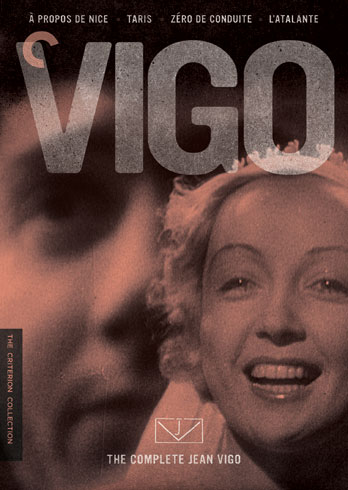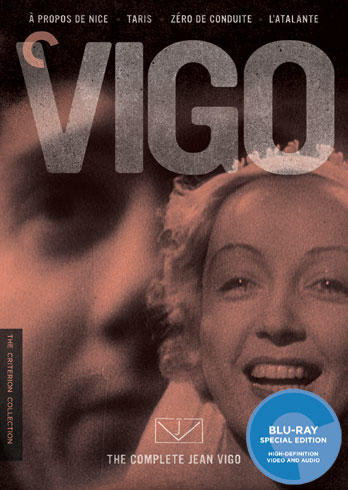Spielberg. Kubrick. Kurosawa. Hitchcock. These are a few of the cavalcade of names that one would find to be synonymous with greatness in the world of film. However, if there is one thing that Criterion is best at in this world, it’s introducing a name, to the public, that should very well be tossed alongside those all-time greats.
That’s the case with their relatively new box set, The Complete Jean Vigo. Looking at this director’s entire filmography, Criterion has released the new set, putting together the four films from the unsung hero of cinema, together for the first time on DVD and Blu-ray. Ranging from experimental neo-documentary shorts to what many believe to be one of the greatest feature films ever put to celluloid, this box set may be low in quantity, but it spans one of the greatest careers in film history.
Not first chronologically, but the first film many will jump to to start the box is the set’s shortest film, 1931’s Taris. A revelatory documentary short looking at the beloved swimmer Jean Taris, the film features nothing but swimming, and some of the most influential direction around.
There isn’t much content with regards to this roughly nine minute short, but what it is most notable for, and also makes this an interesting place to start digging into Vigo’s career, despite it being his second film, is that it may be the most telling bit of direction from the man. Featuring a cavalcade of his directorial choices such as close ups, freezes, and many other slight touches, the film may be short, but features some truly breathtaking direction and even more stunning black and white cinematography.
Released a year earlier in 1930, Vigo’s debut feature A Propos De Nice is featured in this set, and is yet another documentary short from the director/cinematographer duo of Jean Vigo and Boris Kaufman (brother to Dziga Vertov). A sort of day-in-the-life documentary short looking at life around Nice, France, the film is very much in the vein of another Criterion release, People On Sunday. It’s a vibrant slice-of-life picture, that Vigo himself had proclaimed to be a final blow to the then-current state of life, inspiring a revolution against their ‘escapism.’
Clocking in at 25 minutes, the film is very much like Taris, in that it marks a director both in touch with his own style (he had worked as an assistant cameraman in Nice) and also working out the kinks that any young filmmaker would work through, making it a viscerally exciting bit of filmmaking. The narrative itself is telling of a filmmaker looking to make a change, as you see both the beauty of Nice, as well as the absolutely stagnant nature of the people who have seemed to take for granted their surroundings.
The third film collected here, and the director’s first narrative feature, is Zero de conduit. The 1933 film is very much a pre-cursor to a film that seems directly inspired by it, Francois Truffaut’s The 400 Blows. Taken from Vigo’s own experiences in boarding school, the film is a French New Wave film decades prior to that descriptor even being a pipedream. With an anything-goes approach to childhood and what it truly means to be young, the film is an uproarious and energetic look at the oppressive nature of youth. A bewildering blend of anarchic filmmaking and surreal style, Conduite is a breath of fresh air in Criterion, a film with the look of a ‘˜30s film, with the vibe of a ‘˜60s gem, and relevance that spans decades.
Finally, and most importantly, the director’s final, and greatest, work, L’Atalante. A 1934 film, the film has been considered by many to be one of, if not the very greatest film ever put to screen. The film tells the story of a newlywed husband and wife duo, who go on a honeymoon of sorts, heading from Le Havre to Paris on a beat up boat. However, the film is so much more than that.
As with any Vigo film, the style is absolutely mind-bending. Vibrantly shot and viscerally edited, the film has style to spare. However, also as with any Vigo film, it’s the narrative that stands out the most. With any great filmmaker comes the ability to encompass more than just your given runtime. Through the roughly 90 minute runtime, Vigo is able to tell this couple’s story from their loving marriage, through all the trials and tribulations that one couple goes through during their union. Flirting, jealousy, revenge, forgiveness, are all themes found within this stunning bit of ‘˜30s cinema. It’s easy to understand why this became a go to feature for those within the French New Wave, and is a naturalistic look at life, love, and what happens when two humans try to spend their lives arm in arm. Poetic is an easy word to toss out when describing this film. But honestly, this piece deserves words that haven’t even been created yet. It’s a film that simply needs to be seen.
And that doesn’t even begin to describe the greatness of Criterion’s release. Audio and visual wise, films this old have no right looking and sounding this wonderful. One of the greatest Blu-ray releases of recent memory, Criterion’s transfer is, as usual, top notch, with the sound being arguably even better. The scores haven’t sound this good since they were first performed, and honestly, the films look better than they ever have. Rarely seen outside of film classes, many of Vigo’s works have been available to stream on outlets like YouTube, but this makes any and all releases of Vigo’s works to be wholly unnecessary.
But that’s not all. This thing is as far from bare bones a release as one can get. Featuring commentary on all films by author Michael Temple, A propos de Nice is a film focused on here, not only with a second score from 2001 by Marc Perrone, but also alternate edits with footage that was left out by Vigo himself. Vigo is featured in an episode of the French series Cineastes de notre temps, from 1964, and four years later would bring us a chat between Francois Truffaut and Eric Rohmer about L’Atalante, which is also featured here. Michel Gondry, a modern day filmmaker who is easily seen as a director influenced by Vigo, has a short but massively entertaining animated tribute to the director, and director Otar Iosseliani is also interviewed about Vigo. Finally, a 2001 documentary looking at the history of L’Atalante is also included, along with an extensive booklet. Personally, all of these are some of the best features around. The weak link are easily the two director tributes, Iosseliani and Gondry, both being far too short. The Truffaut and Rohmer discussion is amazing, as is the L’Atalante documentary, Les voyages de ‘˜L’Atalante’. Toss in some really interesting commentaries and a great score for A propos de Nice, and you have what is easily the must-own Criterion Collection release of 2011.






![Bergman Island (The Criterion Collection) [Blu-ray]](https://criterioncast.com/wp-content/uploads/2022/11/bergman-island-the-criterion-collection-blu-ray-400x496.jpg)
![This Is Not a Burial, It’s a Resurrection (The Criterion Collection) [Blu-ray]](https://criterioncast.com/wp-content/uploads/2022/11/this-is-not-a-burial-its-a-resurrection-the-criterion-collection-blu-ray-400x496.jpg)
![Lars von Trier's Europe Trilogy (The Criterion Collection) [The Element of Crime/Epidemic/Europa] [Blu-ray]](https://criterioncast.com/wp-content/uploads/2022/11/lars-von-triers-europe-trilogy-the-criterion-collection-the-element-of-400x496.jpg)
![Imitation of Life (The Criterion Collection) [Blu-ray]](https://criterioncast.com/wp-content/uploads/2022/11/imitation-of-life-the-criterion-collection-blu-ray-400x496.jpg)
![The Adventures of Baron Munchausen (The Criterion Collection) [4K UHD]](https://criterioncast.com/wp-content/uploads/2022/11/the-adventures-of-baron-munchausen-the-criterion-collection-4k-uhd-400x496.jpg)
![Cooley High [Criterion Collection] [Blu-ray] [1975]](https://criterioncast.com/wp-content/uploads/2022/11/cooley-high-criterion-collection-blu-ray-1975-400x496.jpg)